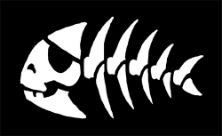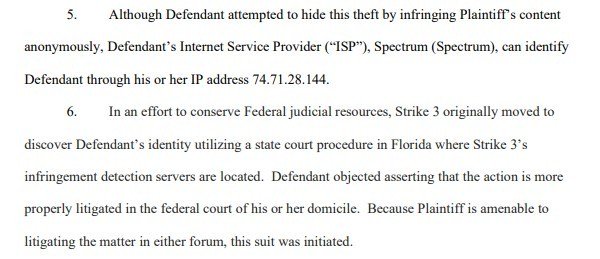Copyright Troll Back in Federal Court After it Fails to ‘Save Judicial Resources’

A few days later we found out that the adult entertainment company hadn’t really halted its efforts. Instead, it had moved to a Florida state court where it targeted dozens of alleged copyright infringers at once.
This maneuver is controversial. Copyright cases are a matter of federal law and generally don’t belong in state courts. However, Strike 3 filed their cases as a complaint for “a pure bill discovery.”
This means that, instead of filing a copyright complaint, it asked the court to allow it to request subpoenas against ISPs to identify the alleged pirates. That information can then ‘possibly’ be used to file a federal case. Or it can be used to directly demand settlements from alleged infringers.
The advantage of the latter option is that Strike 3 can target dozens if not hundreds of alleged pirates in a single case. This saves tens of thousands of dollars in filing fees, as many federal courts only allow one defendant per case.
The move to state courts has prompted objections from various copyright attorneys. They argue that these cases don’t belong in state court and, as we highlighted a few days ago, the general belief is that Strike 3 is taking this route to save money.
The company itself sees things differently. Just days after we pointed out the lack of action in federal courts, the company filed a handful of new cases. However, these come with a twist.
The new cases we spotted specifically target IP-addresses that are associated with subscribers who objected to Strike 3’s state court shortcut. The timing, which coincides with our reporting, is interesting, and so are Strike 3’s arguments.
In the new complaints, the company states that it took its cases to state court to save “judicial resources” at the federal court. That the same move also saves tens of thousands of dollars in legal costs for the company itself isn’t mentioned.
“In an effort to conserve Federal judicial resources, Strike 3 originally moved to discover Defendant’s identity utilizing a state court procedure in Florida where Strike 3’s infringement detection servers are located,” Strike 3 writes (pdf).
“Defendant objected asserting that the action is more properly litigated in the federal court of his or her domicile. Because Plaintiff is amenable to litigating the matter in either forum, this suit was initiated,” the company adds.
85e3b441-250d-4eb0-bae1-b281e415a048
Strike 3’s suggestion that it merely wanted to help bring down the caseload at the federal court is something many skeptics will doubt. Whether it’s true or not, it does reveal that the company didn’t intend to file federal cases against all defendants.
After all, that would ultimately result in the same caseload for the federal court.
In other words, the plan was to reveal the identity of alleged pirates through the state court without filing a copyright case. The company could then use that information to extract settlements from these defendants, for a fraction of the time and costs at the federal court.
But apparently the costs reduction is just a by-product. The real goal here, according to Strike 3, was to conserve federal judicial resources.
Source: TF, for the latest info on copyright, file-sharing, torrent sites and more. We also have VPN reviews, discounts, offers and coupons.




Leave a Reply
Want to join the discussion?Feel free to contribute!